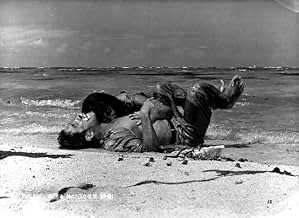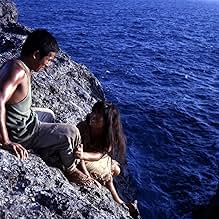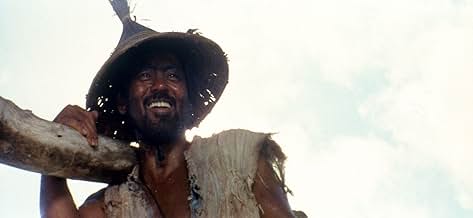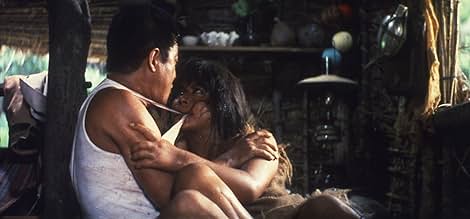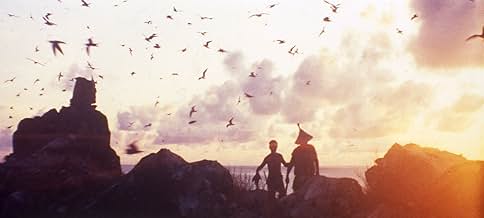Aggiungi una trama nella tua linguaAn engineer from Tokyo arrives on a drought-ridden tropical island to drill a well to power a nearby sugar mill. He meets the inbred Futori family, hated by the locals for breaking religious... Leggi tuttoAn engineer from Tokyo arrives on a drought-ridden tropical island to drill a well to power a nearby sugar mill. He meets the inbred Futori family, hated by the locals for breaking religious customs.An engineer from Tokyo arrives on a drought-ridden tropical island to drill a well to power a nearby sugar mill. He meets the inbred Futori family, hated by the locals for breaking religious customs.
- Regia
- Sceneggiatura
- Star
- Premi
- 5 vittorie e 1 candidatura in totale
Recensioni in evidenza
Director Shohei Imamura personal project film involving an uninhabited somewhat tropical island and it's prehistoric islanders come to fruition once an engineer (Kazuo Kitamura) from Tokyo city attempts to make plans regarding the island as a whole, and transitioning it into a sugar cane factory. Meeting first is the eldest,Yamamori, (Kanjûrô Arashi), appointed as the engineer's protege, is the son, Kametaro (Chôichirô Kawarasaki), appointed priestess of Noro Uma Futori (Yasuko Matsui), an sexually repressed inbred, Turiko (Hideko Okiyama) and the oldest always chained son, Nekichi (Rentarô Mikuni) violated many superstitious rules regarding the islands customs and traditions.
Profound Desire of the Gods immerses one, for nearly three hours, in the community of Kurage, located in the in the tropics, on a small island with jagged cliffs, lost in the middle of the Pacific. Its amazing, from the wide and exotic photo to the allegorical representations of the human condition.
The film's successes are its luscious landscape, evocative production design of heathen and pagan rituals and artifacts, and portrayal of suppressed, taboo desires bursting to the fore. The narrative wanders and explores various tangents that can challenge the attention. This is filmmaking for cinema, and the gorgeous golden beaches and turquoise oceans had me longing to see this on the big screen. A murder by masked men at the end is also visually compelling. This film is interesting in bits, and flashes of genius occasionally show themselves, but the lack of coherence, repetition in the storyline, and outright dud moments (the heavenly vision of the departed patriarch), make this a problematic addition to the Imamura oeuvre. It hints at the great film that this project could have become, a realization of the potential of the vision, rather than the vision itself. Sometimes amazing, sometimes disappointing, this is one to watch and argue over.
Profound Desires of the Gods is an engaging, provocative and bizarre piece that ostensibly explores on a number of different levels the duality of Japan's relationship with it's own culture and tradition versus the tide of modernisation and influence from the outside world. The story takes place on the fictional, but obviously Okinawa-inspired, southern Japanese island of Kurage and centres on the lives of the Futori family, who hold the claim to the oldest blood-line on the island. It is quickly made apparent that the Futori's are heavily inter- bred and are shunned and ostracised by the island's community, who refer to them as 'beastly' and believe that their incest is responsible for the islands misfortune. The family's patriarch, old and possibly-senile Yamamori, is both Father and Grandfather to Toriko, a dumb-witted girl whose childlike manner belies her almost feral desire for sex, while Toriko's Mother and Yamamori's Granddaughter Uma is a 'noro' or seer, who lives away from the family at the local shrine (the last remaining fresh water source on the island). Meanwhile, Uma's Son Kametaro is the most normal of the group and struggles to come to terms with his incestuous feelings for his sister Toriko and the islanders distaste for his family, while his Father and Yamamori's son Nekichi is imprisoned by his Father at the bottom of a flooded pit for his crimes against the community (dynamite fishing, and attempting an illicit incestuous relationship with their seer, his sister Uma) and given the near-impossible task of dislodging a huge boulder that has blocked the flow of water to the island's rice fields.
The rice fields point to a recurring parallel in the film, representing Japan's traditional agricultural past versus the modern uptake of sugar farming that the islanders turn to after the rice fields become untenable. Yamamori's desire to see the rice fields restored represents his families struggle to retain their ways in the face of the islanders scorn, while the incestuous relationship his family is born from and the parallel it poses to the islands' creation myth (where two sibling deities are married) represents the uneasy relationship some have with their superstitious past and their desire to see it forgotten from the islands culture. This is the central theme of the film, which in itself is a product of the mindset of Japan as a whole at the time the film was made, a Japan almost embarrassed by it's past and wanting to be perceived as modern thinking on the world stage. Although the Futori's incest marks them as outcasts and the negative results of such relationships are on display for all to see, Imamura effectively paints the family as sympathetic characters, symbolising traditions and religious and superstitious beliefs that fall in the face of modernisation, while casting a disapproving eye on the effects Western influence ultimately has on the island.
Profound Desires of the Gods is a complex and often bewildering film that moves at a disjointed, almost leisurely pace. Imamura has us firmly positioned entirely as voyeurs for much of the film, always watching events unfold at a distance, his characters enveloped by wide-angle shots of the beautiful Okinawan scenery that provides us with a cinematic feast for the eyes. His themes of east versus west and tradition versus progress are always present, yet never hammered home until the films climax, leaving the viewer to piece together the entangled web of the Futori's relationships and admire the films cinematography and the natural beauty of Okinawa. And in that regard, the film is a huge success, making up for what it lacks in pacing and narrative with sheer visual beauty and a deeper subtext that ultimately paints Kurage island and it's inhabitants as an allegory for what Imamura perceived as an increasing abandonment of Japanese culture and tradition to serve modern and Western needs. Surreal and thoughtful throughout, accompanied by beautiful and expertly shot visuals and with a message that's as pertinent today as it was then, Profound Desires of the Gods most certainly isn't a film for everyone, but it is in equal turns an epic and singular piece that surely must rank among Imamura's best.
Imamura's view of humanity is a curious blend of pessimism and deep, resonant humor to the extent that they seem to cancel each other out. Perhaps this is why his films are so peculiarly observant, and indeed anthropological. In this respect he's successful both as a "realist" (a notion I'm not fond of in the domain of film but which I use here complimentarily) and a visual poet. In fact, some portions of this film strongly foreshadow Malick's "The Thin Red Line" (1998) in the visual depiction of the narrative role of nature.
All of the Imamuras I know have an image (motif) or a scene that become a kind of hub; definitions of the films and something that stay and live on in the memory. In this film there are many, but two images glow strongest: the pit that Nekichi and the Futoris have been digging for years, as well as the final climax at sea.
On the dedicated forum for this film it has been suggested that there are many parallels between this and Teshigahara's "Suna no onna" (1964). I think that's a connection worth acknowledging and at best it enriches both films.
At this writing this film has received only 475 votes, which is a very small number considering this film has been available on Blu-ray courtesy of the Masters of Cinema series (Region B) for two and a half years.
Lo sapevi?
- QuizOfficial submission of Japan for the 'Best Foreign Language Film' category of the 42nd Academy Awards in 1970.
- Citazioni
Yamamori Futor: He shouldn't take money. The engineer is a god who came from beyond the sea. It will not do to take money for serving that god.
- ConnessioniFeatured in Cinéma, de notre temps: Shohei Imamura, le libre penseur (1995)
I più visti
- How long is Profound Desires of the Gods?Powered by Alexa
Dettagli
- Data di uscita
- Paese di origine
- Lingua
- Celebre anche come
- Profound Desires of the Gods
- Luoghi delle riprese
- Ishigaki-jima, Ryukyu Islands, Giappone(Spelling error)
- Azienda produttrice
- Vedi altri crediti dell’azienda su IMDbPro

